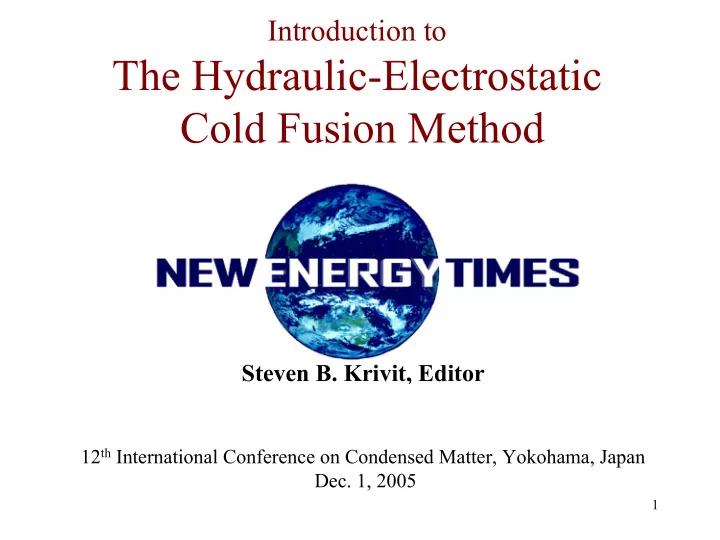

Introduction to The Hydraulic-Electrostatic Cold Fusion Method Steven B. Krivit, Editor 12 th International Conference on Condensed Matter, Yokohama, Japan Dec. 1, 2005 1
A New Method • Demonstrated on June 6, 2005, –Edmonton, Canada • Research Manager: –Hyunik Yang, professor of mechanical engineering at Hanyang University, Korea 2
Yang’s Research Team • Alexander Koldamasov, (ret.) Russian National Research Institute of Atomic Engineering • Andrei Desyatov, deputy director of the Russian Aviation and Space Agency • Alla Kornilova, Moscow State Univ. • Vladimir Vysotskii, Kiev Shevchencko Univ. • Nahm Cho, Hanyang Univ. 3
Another Russian Team and Patent Holder • Yevgeny Velikhov, president Kurchatov Research Institute • Gerasimovich Gnedenko, director Kurchatov Research Institute • Vital’evich Goryachev, associate director Kurchatov Research Institute 4
The Claims Some Novelty / No Validity Valid as Asserted Some Validity 5
Progress of Cold Fusion •Excess energy ~ 10% •Milliwatts: High repeatabability •Excess energy ~ 2500% •Tens of watts: Low repeatability • Challenge: High power levels, high repeatability 6
Acoustic Cavitation Fusion Research • Stringham – Cold Fusion with D and Pd – 40 watts excess power. • Taleyarkhan – Hot Fusion with deuterated acetone and neutron generator. No excess energy. 7
Mechanical Cavitation High hydraulic pressures and velocities, pumping a fluid in a recirculating system combined with electrostatic effects. 8
Simplest Description: “It's a tube and a hole.” (McKubre) 9
New Energy Times 10
The Cell New Energy Times 11
Cell with Electrical Taps New Energy Times 12
Electrical Discharge in Machine Oil 13
Mechanical Cavitation 100 % Repeatable Sustainable Controllable Apparent Excess Energy 14
General Characteristics No host metal (palladium) required No deuterium / heavy water required No electrochemistry 15
Why Is This Cold Fusion? Apparent excess energy from hydrogen at low temperatures Apparent branching ratio favoring helium and not neutrons or gamma. 16
New Energy Times Alexandr Koldamasov - Hyunik Yang 17
Bill Harrington 18
Norm Arrison 19
Technical Briefing June 6, 2005 New Energy Times
Edmonton Demonstrations First: Monday June 6, 2005 (day) Second: Monday June 6, 2005 (evening) Third: Tuesday June 7, 2005 (evening) 21
New Energy Times The small machine. Cell for mid-size machine sits on table.
New Energy Times Cell Heat Exchanger Pump Motor
Water Purification System New Energy Times Cell Pump Hydrogen Collection Tank
Observations 1. Three visible effects: Arc, Sparkle, Glow. 2. Appearance of vaporized oil. 3. Tin and Tout ∆ is perceptible by touch. 4. Control screen display of 1000% Px (Heat). 5. Start and stop at will. 6. Increase or decrease effect at will, immediate. response. 7. Effects start immediately. 25
Main Products Reported 1. Heat. 2. Electrical discharge. 3. Also Hydrogen, Helium, Steam. 4. Multiple audits performed (private). 5. Control cell ∆ T = 0.5 º. 6. Test cell ∆ T = 8 º . 26
Radiation Reported 1. No radioactive materials used. 2. No long-lived radioactivity produced. 3. Low-level transient radiation produced during low power operation. 4. Shielding required for neutron and gamma emissions produced at higher operating power levels. 27
Martin Fleischmann • “ It's so simple, I should have thought of it! ” • “ I think it's real all right. Assuming that they have instrumented the system properly, there is no doubt it generates excess heat. ” • “ Under certain circumstances, a liquid can behave like condensed matter. ” • “Same difficulties as we went through.” 28
Peter Hagelstein • Feb. 13, 2005: “It was possible to verify by touch the presence of a sizeable temperature increase.” “The basic claims of energy and charge creation correspond to massive effects that are readily observable independent of any of their diagnostics.” “In the course of my review, essentially no scientific data was presented.” 29
McKubre - Mizuno – No comments “on the record.” 30
What’s Missing Hard data None yet. Replication? Not Independent. Machines are in labs in Russia, Canada and Korea. Scientific Publication? No. 31
Resolution? Good Magic ? OR Good News ? 32
33
Recommend
More recommend